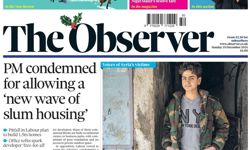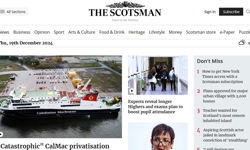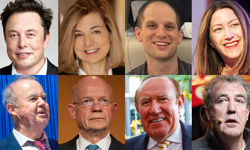Early morning commuters in London and elsewhere these days might sometimes see people taking detailed photographs of the bins containing Metro, the free newspaper.
The recording is not evidence of nerds at work or fans of gritty scenes in railway stations. They are in action on the express instructions of Steve Auckland who recently became managing director of Metro for the second time in his career.
Back to basics
Auckland has asked his people to take the pictures of the bins to make sure they are in their correct places to ensure maximum impact with readers and that they have not been carelessly pushed out of the way by station staff. He is the sort of newspaper executive who pays attention to detail.
“We pay London Underground and Network Rail a lot of money for the bins and we want them sited in the right place so that it is very easy for the papers to be picked up,” says Auckland who believes it’s really important to get what he calls “the hygiene factors” right in any business.
“If you look after the small things brilliantly, then funnily enough, at the other end, everything becomes clear. A lot of people lose sight of that and go for a grandiose strategy. It doesn’t always pay off unless you get the basics right,” says Auckland in a stand-up interview.
The straight-talking Yorkshire newspaper executive doesn’t like sitting down and works at a stand-up desk. During his first stint in charge of Metro, he made himself unpopular by running a stand-up boardroom. That’s gone now but he has still got his stand-up desk.
The attention to detail is just part of a rebalancing at the Metro which began again for Auckland little more than a month after he resigned in October as chief executive of David Montgomery’s Local World.
There was a sense, he explains, that although great infrastructure had been put in place for Metro’s digital operations, things had perhaps “gone over the edge” and focus had been lost on what had been happening with print. Certainly revenues in the first quarter of last year had been down by between 12 and 15 per cent.
“Ninety per cent plus of our money is coming from print. Metro is a digital type product in the sense of easy access, it’s free, you can pick it up and put it down easily, but I thought we had to look at the print product and really get it together,” explains Auckland who is ultimately responsible for 1.36 million copies of the Metro daily – 760,000 of them in London.
Apart from getting the right numbers of the paper in the right places at the right time, Auckland wants to make Metro “a really strong proposition again” with both readers and advertisers – the sort of paper that gets talked about.
By concentrating on the basics and starting to get out into the market and “front of mind” with leading agencies, revenues are already around 10 per cent up.
“I think we have only just started, that there is a lot more we can do. I quite like the fact that while everyone is rushing to digital, I will be rushing to print for the next twelve months,” adds Auckland.
In January, he went back to the future by recruiting two former senior Metro colleagues – Karen Wall as executive director, together with Grant Woodthorpe who rejoined the company as trading director.
Metro: the early years
Auckland first came to Metro in 2001 two years after it was founded by Lord Rothermere. The paper was by then already well established in London and the national roll-out had begun, but targets were not being hit and the paper’s regional partners were unhappy.
Enormous work was put into distribution – the majority of the copies go out between 6.30am and 9.30am – and the national spine was extended to include cities such as Cardiff, Liverpool and Bristol.
Great efforts were also made to understand the readers and then selling that knowledge to agencies.
“We really got under the skin of the 18 to 44 year-old audience, the urbanites, what turned them on, what interested them and how we could make ourselves relevant to that,” explains Auckland.
An “urban life” research panel routinely found very high percentages were planning to go out that very night and the young readers were also very enthusiastic about their favourite brands. Such readers were attractive to advertisers.
It all became a virtuous circle that led to profit for Metro, and for Auckland, his career took him first to the managing director’s job at Northcliffe Media, and then on to become chief executive of Local World, the local newspaper conglomerate that groups Northcliffe and Iliffe, plus a stake from Trinity Mirror.
Life at Local World
“When I got into Local World, the business had stalled. It wasn’t losing money but it wasn’t in a good position. You only had to do the line forward two or three years and this business could be losing a lot of money,” recalls Auckland.
He had to get, as he puts it, “stuck into the cost base” and in 18 months, 90 per of the managing directors and about 85 per cent of the editors were changed. Some were promoted from within, others were brought in from outside.
“We needed to get a fresh team in place. I would like to think we brought some of the good operators in who can manage change and embrace it,” says Auckland who says that Local World has really started to power ahead this year. In some cases, digital sites are starting to offset declines in print, producing an overall revenue growth for the first time in years.
Auckland believes that Montgomery’s relentless daily drive on “unique users” as well as circulation figures is paying dividends.
One of the most controversial aspects of the Local World model was the theory that the local paper should be the focus and collection point for all information in a community. Everything, including press releases and statements from local bodies, would simply be hoovered up, in addition to more conventional journalism.
“David is saying it should be 80 per cent from other sources. I don’t think they are anywhere near that at this stage. My understanding is that they are not hoovering up copy from all over the place but individual MDs and editors obviously take some good feeds from people anyway,” Auckland explains.
He concedes there is more contributed or native copy – though the Metro managing director hates the “native” term and has tried to ban it.
“It’s features content guys,” says Auckland who sees nothing wrong with a good contributed fashion spread as long its origins are made clear to readers.
But with everything heading on “the forward trajectory”, why did Steve Auckland unexpectedly resign from Local World without another job to go to?
He declines to discuss the reasons but the most likely explanation is that Auckland is very much a hands-on chief executive and David Montgomery was a very executive chairman and that they were increasingly bumping into each other. Montgomery then became chief executive of the venture.
Obviously as board members of Local World, Daily Mail and General Trust was aware of Auckland’s intention. The Boston Consulting Group was doing consultancy work in the Daily Mail and two weeks after leaving, Auckland was asked if he would do a bit of project work.
“Two weeks after that, they said: ‘Look we want to make a change at the Metro, would you be interested in doing the Metro job,” says Auckland who had been out of work for about a month.
Is it ever a good idea to go back?
“Never ever go back? Tell that to José Mourinho,” says Auckland who naturally pays more attention to the affairs of Leeds United than Chelsea.
Getting the balance right
Anyway, as Auckland says, he believes there is still a long way to go at his new, old job.
Another hope is that he can increase online readers by persuading then to take a 20-minute gap in their working day to look at the most popular Metro stories.
Overall, Auckland believes that newspapers are starting to get the balance right between digital and paper, though it is obviously more difficult for the paid-fors than the frees.
“We all know it is going to go digital but how much of your resources – 50 per cent or 60 per cent - go into digital when you have to take a stack of costs out which tend to come out of your print operation. That’s the dilemma people face,” says Auckland.
The Metro is always going to lead by being a strong print brand, Auckland insists, but he believes he can take the “urbanite” idea much further and, apologising in advance for slipping into non-Yorkshire marketing jargon, “extending that media journey with them”.
First base is to get everyone re-engaged with the print product but after that, there will be opportunities to develop the brand and pull away from being tarred by the advertising market for print.
“Over the past few years, we have always looked at the TV market. If TV took a bit of a dip, Metro took a dip and vice versa. Over the past year or so, we seem to have been dragged into the print market and we have to shift ourself into the branded content market which TV does so well,” he explains.
Over the next eighteen months to two years, the Metro managing director will start to try to put flesh on a number of ideas he is already mulling over.
“Other publications yes, but maybe other businesses, other opportunities,” says Steve Auckland who says he always likes to be thinking that little bit ahead.
And as he talks, he is still standing.












